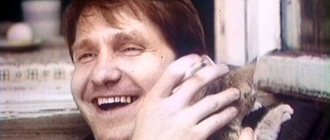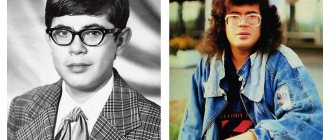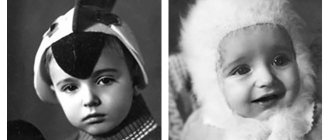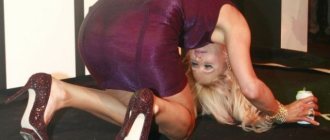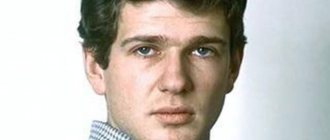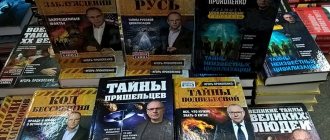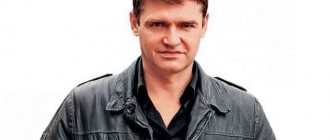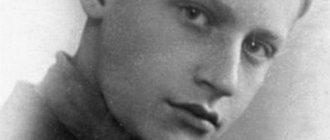Childhood of Igor Dmitriev
He owes one of the most memorable events of his childhood to his mother. She was a ballerina and dancer in the circus, where she once brought her four-year-old son to see her perform. The child was fascinated by the atmosphere of this place. Little Igor was no less impressed by his mother’s conversations with her friends about theatrical life. Along with his interest in acting, his artistic talents grew. He began giving his first performances to his neighbors in a communal apartment with the help of an amateur puppet theater. And at the age of 7 he made a serious statement that he wanted to be an actor.
Actor Igor Dmitriev in his youth
Continuation of film career
After a long break from work, actor Igor Dmitriev (see photo above) returned to the film set. In 1950, he received a small role in the film Mussorgsky. Then several more films with his participation were released. The actor learned about what real success and audience love means after filming the film “Quiet Don.” He managed to convey the character and emotional mood of his character - Evgeny Listnitsky.
View gallery
What contribution did actor Igor Dmitriev make to the development of Russian cinema? His filmography includes over 100 roles in TV series and feature films. Let us list his most striking and interesting film works:
- “She loves you!” (1956) – Pylnikov;
- “Virgin Soil Upturned” (1958) - Lyatyevsky;
- “The Black Seagull” (1962) – wounded;
- “Dauria” (1971) - captain Solomonov;
- “Where are you, knights” (1972) - Ermilov;
- “Golden Mine” (1977) – Doctor Podnieks;
- “Fire Roads” (1978) - Medynsky;
- “At the End of Summer” (1980) - Anton Andreevich;
- “Beyond the Blue Nights” (1983) - Khrapov;
- “The Watchmaker and the Chicken” (1989) – Count;
- “Chicha” (1991) - Krutitsky;
- “Russian Transit” (1994) - Mezentsev;
- “Give me moonlight” (2001) - Sorokin;
- “Poor Nastya” (2003) - Obolensky;
- “The Golden Calf” (2006) – monarchist Khvorobiev.
View gallery
First successes in cinema and first life difficulties
The little artist made his debut on the big screen at the age of 12.
He first appeared in the short film “The Voice of Taras,” filmed by V. Fainberg and telling about the liberation of Western Ukraine. But soon two tragedies stood in the way of the acting path, which the Dmitriev family barely managed to survive. The stepfather was arrested, whose return from the camps he never waited, and the mother, who was luckier, and, a few months later, she returned to her son. But the war soon prevented them from living happily ever after in their native nest, and the Dmitrievs were forced to move to Perm, where the village of Nizhnyaya Kurya became their new refuge. Here, the wounded in military hospitals became connoisseurs of his acting talent, for whom he performed at concerts organized for them.
Encryption to Japan
- What kind of unusual ring is this??
— The intelligence officer’s wife was in love with our “marquis.” Her name was Rita K. For obvious reasons, I cannot give my last name. My husband, by the way, also Igor, knew everything. He was a secretive, extremely reserved, cold person. I think that’s why Rita, although she was over 40, fell in love as a girl with Dmitriev’s artistry and open soul. I have preserved not even her letters, but her “cry from the soul.”
...with whom the actor lived for 30 years, he was very worried. Photo: © RIA Novosti
- What about the wife??
- What about Larisa? Let's put it this way: in the last years of his life, Igor was not interested in women. (They tell how Dmitriev came to the actor’s holiday home with a young man whom he introduced as a cousin, although everyone knew that they were not related. - N.M. ) Therefore, he could not have a carnal affair with Rita . But platonic feelings covered them. Once Rita’s husband was sent to Japan for work, and she left with him. She was very worried about breaking up with Igor. A few months later, Rita wrote a letter in which she indicated the address - “Tokyo, center,” and so on. And then one day Igor and I came to Vladivostok at that time for creative evenings. We went out for a walk, and Igor suggested: “Let’s go to the main post office and give Ritka a telegram.” We, two fools, went and sent a playful telegram, without thinking about the consequences: “We arrived in Vladivostok. Now every day at 11.47 GMT we will stand on the shore and look in your direction. Come out." It looks like a code. I can imagine what a commotion there was at the intelligence officer’s work when the telegram arrived.
Igor Borisovich was friends with actor Oleg BELOV for more than 40 years...
“Is that why there are Japanese characters on the ring?”
— A year later, Rita came to St. Petersburg and gave Igor a gold ring as a souvenir. He made a signet out of it, soldering the ring into the ring. And I wore it all my life. When Igor died, his only son Alyoshka flew from America to dispose of the property. For him, this ring is an empty phrase, so I asked him to give it to me as a souvenir... One day, while walking along Nevsky, I saw a company of Japanese and asked what these hieroglyphs meant . It turned out that these were “lucky” hieroglyphs.
— How did Rita’s life turn out?
— Rita was at Igor’s funeral, crying. She recently died of a heart attack. Her husband did not believe that this was a purely platonic relationship and was very jealous. I think I still haven’t forgiven my wife and Igor.
...and he alone revealed the secret of the ring. Photo by Natalia MURGA
Study and beginning of the career of Igor Dmitriev
In 1943, a theater studio was opened at the Perm Drama Theater, where Dmitriev decided to go to study.
Subsequently, it literally became a second home for him. He lost all interest in school subjects and soon dropped out of school to spend all his time in the studio. In 1944, having received his mother’s blessing, Igor Dmitriev goes to conquer the capital, or rather the theater institute. But the lack of a secondary education certificate stood in his way. That’s when he had the opportunity to show all his ingenuity and acting resourcefulness. He goes to the aviation institute, which previously had a fire that destroyed all the documents, and in front of the admissions committee, masterfully feigning despair, he asks about the fate of his certificate. They, taking pity on the poor student, offered him admission without exams, but Dmitriev stated that he did not intend to study at their institute again, but wanted to receive a copy of the certificate. And received. Despite the fact that he applied to four theater institutes and was accepted into two of them, he, inspired by such success, refuses to study at them and decides to enter the school-studio named after. Nemirovich-Danchenko at the Moscow Art Theater, where he was subsequently enrolled in the class of Massalsky and Blinnikov.
Igor Dmitriev. “Visiting Dmitry Gordon” (2004) The studio taught not only acting technique and skill, but also discipline and culture of communication. For every offense: whether it was late attendance at classes, lack of homework, or untidiness in a suit, there was a punishment. At the same time, teachers encouraged students for diligent study and organized meetings with famous cultural figures, including Anna Akhmatova, Svyatoslav Richter, and the English playwright Priestley.
However, Dmitriev was not an ideal student and understood that, due to the lack of any brilliant achievements at school, he was unlikely to be accepted into the Moscow Art Theater. Therefore, after graduating from school, in 1948, he went to his native Leningrad and entered the theater. V. F. Komissarzhevskaya. Here he was noted for his roles in the play “Simplicity is Enough for Every Wise Man,” in P. Kapitsa’s play “On the High Seas,” in the vaudeville “Lev Gurych Sinichkin” and others.
Biography
Childhood
Igor Dmitriev was raised by his mother and grandparents. According to him, he remembered his father, yachtsman Boris Petrovich Dmitriev
Igor’s mother, Elena Ilyinichna Tauber Dmitriev’s first marriage Baulin’s second marriage ; 1905-1984), Jewish by nationality, was a ballerina, worked in the music hall for the famous Kasyan Goleizovsky, as well as in the Sverdlovsk ballet and circus - performed in shows -attraction “Horses and Dancers”; taught historical and everyday dance at the Perm Choreographic School. The circus became one of the most vivid childhood experiences for Igor.
Another serious hobby of Igor was the theater.
At the age of seven, Igor Dmitriev began performing in school amateur performances and in the Song and Dance Ensemble of the Leningrad Palace of Pioneers, led by Isaac Osipovich Dunaevsky. It was then that the boy announced for the first time that when he grew up, he would become an actor.
Igor Dmitriev’s film debut took place in V. Fainberg’s film “The Voice of Taras.”
War
With the beginning of the Great Patriotic War, Igor’s family was evacuated to the Molotov region in the village of Nizhnyaya Kurya. There was a Rivermen's Club, where Dmitriev went with other guys, read poetry, sang, danced and took part in concerts in military hospitals in front of the wounded.
In 1943, Igor Dmitriev learned that a theater studio was opening at the Perm Drama Theater, and went there to audition. For the exam, Igor read scenes from Lermontov’s “Masquerade” both for Arbenin and, due to the absence of a partner, for Nina. The selection committee announced the verdict: “You are no Arbenin, but Nina is pure purity and innocence. We accept it for Nina!”
Return of Igor Dmitriev to cinema
In 1955, the command “Motor!”, familiar from childhood, sounded for him again. and, sixteen years later, he returned to the big screen, where he appeared in S. Derevyansky’s film “She Loves You.” In 1957, he got a significant role in Sergei Gerasimov’s film “Quiet Don”, where he played Yevgeny Listnitsky. Dmitriev learned a lot from Gerasimov, considering working with him as a kind of second school after the Moscow Art Theater. And the star role in “Quiet Flows the Don” became the impetus for his subsequent filmography.
Prompter, prop maker, assistant director
Ivan Dmitriev. Photo: topspb.tv
Ivan Dmitriev was born on July 30, 1915 in the city of Vyshny Volochek, Tver province. In 1923, he entered the local seven-year secondary school. At an early age, the boy became interested in theater; in the fifth grade, he enrolled in a local drama club. Sometimes, together with his comrades, he performed on the city stage, and saved the money he earned for a trip to Leningrad - he dreamed of studying in this city.
Later, Dmitriev got a job at the Vyshnevolotsk City Theater. The young man worked as a prompter, prop man, assistant director, supporting actor - in total, the future actor served here for three years. He wanted to play on stage. But one day Dmitriev attended a circus tent performance and decided to become an acrobat.
In 1932, Ivan Dmitriev moved to Leningrad, where he planned to get an education at a circus school. Walking around the city, he saw an advertisement for enrollment in the first year at the Leningrad College of Performing Arts. Dmitriev decided to go there: after all, theatrical art was already familiar to him, unlike circus art. The young man successfully passed the entrance exams, and he was enrolled in the technical school for the course of Nadezhda Komarovskaya. The study lasted four years.
During his student years, Dmitriev already played on the stage of the State Academic Drama Theater: he performed supporting roles in the plays “Masquerade” and “Boris Godunov.” At that time, the theater was directed by Boris Sushkevich, and he invited the young artist to join the troupe. But Dmitriev refused: he wanted to gain more experience.
I had an offer to the Alexandrinsky Theater, but I refused. Because next to these actors I will carry out a tray for years, I am not worthy, I still don’t know how to do anything. No, I have to get enough of acting myself somewhere, get my hands on it, so that I’m busy all the time, playing roles. That's how he thought wisely.
Ivan Dmitriev in the documentary film “Episodes”
After technical school, Ivan Dmitriev got a job at the Leningrad Comedy Theater. In the theater he got small roles, but the artist himself recalled that for the first time he felt successful. In 1938, Dmitriev was offered a role in the film, and he agreed. However, the filming process soon stopped, and the actor could no longer return to the stage: director Nikolai Akimov did not approve of the cooperation of theater artists with the film industry.
Forced departure from the theater
For some time he still worked in the theater, however, in 1967, having received an offer from his friends from Italy to go abroad, he wrote a statement to the director of the theater, in which he informed him that he would be absent for some time, and that he had There is a backup to replace it.
The director responded by firing Dmitriev, arguing that he did not want a breakdown in discipline in the troupe. Later, he asked the actor to return, but Dmitriev refused him, which he later often regretted. Soon he receives an invitation to work from the director of Lenfilm at the Film Actor Studio, the years of work in which were the most fruitful for him in cinema. But leaving the stage haunts him. And he creates a one-man show “Masquerade”, in which he himself played all the characters. The only props he had were white gloves, a mask of the Unknown, a fan that fit in his “attaché case,” and an old mahogany chair that he took with him to every performance. And it was shown more than 60 times in different theaters across the country. After that, he completely went into cinema and worked with such famous directors as G. Kozintsev, J. Fried, L. Bykov, Emil Loteanu and others. According to Jan Fried, Igor Dmitriev “did not allow himself to do anything half-heartedly.”
If you need to play a prince playing the cello, then Dmitriev will master playing this instrument; if you need to play a Cossack on a horse, then he will take horse riding courses and become this Cossack. Thanks to his zeal, manners, as well as suitable appearance and polished bearing, directors often offered him to play officers, marquises, princes, barons - representatives of blue blood.
Actor Igor Dmitriev died in 2008
Igor Dmitriev worked not only at the domestic film studio, his track record includes Hungary, the German Democratic Republic, Poland, the USA, Morocco, Algeria, where he was lucky enough to act with world stars.
Studying at the Moscow Art Theater School
Soon Igor Dmitriev made the final decision to enter the theater school. Having calmed his mother, he goes to Moscow.
Igor submitted applications to several institutes at once. VGIK and the Vakhtangov School did not accept him, but they accepted him into the Maly Theater and GITIS. Having such a rear behind him, he also took the risk of enrolling in the Moscow Art Theater School, and he succeeded.
Igor Dmitriev recalled his years of study: “I found the Art Theater in its prime: Kachalov, Moskvin, Knipper-Chekhova, Tarkhanov shone on the stage. We became very friendly with Mikhail Pugovkin , with whom we lived in the same room in the dorm. Misha and I were terribly lucky: usually twelve people huddled in the rooms, and we lived together. However, our monastery could not even be called a room - a tiny nook without a window or a door, in addition, one of the walls was the wall of a locker in which the carpenters hung their overalls: in addition to several rooms for out-of-town students, the building housed decoration workshops. We lived, like all students, hungry and cheerful.”
Return to the theater stage
A big event for the cultural life of Leningrad, and for Dmitriev himself, was his return to the theater. In 1984, Yuri Aksenov, also the director of the Leningrad Academic Theater. N.P. Akimov, invites Igor Borisovich to play a role in S. Mikhalkov’s play “Kings Can Do Anything,” which he did brilliantly. Critics praised the actor's remarkable performance in the role of Chinzanov, noting his mature skill and undying stage energy. Then there were successful roles in the productions “Victory Day in the Middle of War” and “Night in Venice”, in the comedies “Freddy” and “Mad Money”.
Excerpt characterizing Dmitriev, Igor Borisovich
Alpatych, at a swimming pace, so as not to run, barely caught up with Rostov at a trot. – What decision did you decide to make? - he said, catching up with him. Rostov stopped and, clenching his fists, suddenly moved menacingly towards Alpatych. - Solution? What's the solution? Old bastard! - he shouted at him. -What were you watching? A? Men are rebelling, but you can’t cope? You yourself are a traitor. I know you, I’ll skin you all... - And, as if afraid to waste his reserve of ardor in vain, he left Alpatych and quickly walked forward. Alpatych, suppressing the feeling of insult, kept up with Rostov at a floating pace and continued to communicate his thoughts to him. He said that the men were stubborn, that at the moment it was unwise to oppose them without having a military command, that it would not be better to send for a command first. “I’ll give them a military command... I’ll fight them,” Nikolai said senselessly, suffocating from unreasonable animal anger and the need to vent this anger. Not realizing what he would do, unconsciously, with a quick, decisive step, he moved towards the crowd. And the closer he moved to her, the more Alpatych felt that his unreasonable act could produce good results. The men of the crowd felt the same, looking at his fast and firm gait and decisive, frowning face. After the hussars entered the village and Rostov went to the princess, there was confusion and discord in the crowd. Some men began to say that these newcomers were Russians and how they would not be offended by the fact that they did not let the young lady out. Drone was of the same opinion; but as soon as he expressed it, Karp and other men attacked the former headman. – How many years have you been eating the world? - Karp shouted at him. - It’s all the same to you! You dig up the little jar, take it away, do you want to destroy our houses or not? - It was said that there should be order, no one should leave the houses, so as not to take out any blue gunpowder - that’s all it is! - shouted another. “There was a line for your son, and you probably regretted your hunger,” the little old man suddenly spoke quickly, attacking Dron, “and you shaved my Vanka.” Oh, we're going to die! - Then we’ll die! “I am not a refuser from the world,” said Dron. - He’s not a refusenik, he’s grown a belly!.. Two long men had their say. As soon as Rostov, accompanied by Ilyin, Lavrushka and Alpatych, approached the crowd, Karp, putting his fingers behind his sash, slightly smiling, came forward. The drone, on the contrary, entered the back rows, and the crowd moved closer together. - Hey! Who is your headman here? - Rostov shouted, quickly approaching the crowd. - The headman then? What do you need?.. – asked Karp. But before he could finish speaking, his hat flew off and his head snapped to the side from a strong blow. - Hats off, traitors! - Rostov’s full-blooded voice shouted. -Where is the headman? – he shouted in a frantic voice. “The headman, the headman is calling... Dron Zakharych, you,” submissive voices were heard here and there, and hats began to be taken off their heads. “We can’t rebel, we keep order,” said Karp, and several voices from behind suddenly spoke up at the same moment: “Like the old people grumbled, there are a lot of you in charge...” “Talk?.. Riot!.. Robbers!” Traitors! - Rostov screamed senselessly, in a voice that was not his own, grabbing Karp by the yurot. - Knit him, knit him! - he shouted, although there was no one to knit him except Lavrushka and Alpatych. Lavrushka, however, ran up to Karp and grabbed his hands from behind. – Will you order our people to call from under the mountain? - he shouted. Alpatych turned to the men, calling two of them by name to mate Karp. The men obediently emerged from the crowd and began to loosen their belts. - Where is the headman? - Rostov shouted. The drone, with a frowning and pale face, emerged from the crowd. -Are you the headman? Knit, Lavrushka! - Rostov shouted, as if this order could not meet with obstacles. And indeed, two more men began to tie Dron, who, as if helping them, took off the kushan and gave it to them. “And you all listen to me,” Rostov turned to the men: “Now march home, and so that I don’t hear your voice.” “Well, we didn’t do any harm.” That means we are just being stupid. They just made nonsense... I told you there was a mess,” voices were heard reproaching each other. “I told you so,” said Alpatych, coming into his own. - This is not good, guys! “Our stupidity, Yakov Alpatych,” answered the voices, and the crowd immediately began to disperse and scatter throughout the village. The two tied men were taken to the manor's courtyard. Two drunk men followed them. - Oh, I’ll look at you! - said one of them, turning to Karp. “Is it possible to talk to gentlemen like that?” What did you think? “Fool,” confirmed the other, “really, a fool!” Two hours later the carts stood in the courtyard of Bogucharov’s house. The men were briskly carrying out and placing the master's things on the carts, and Dron, at the request of Princess Marya, was released from the locker where he had been locked, standing in the courtyard, giving orders to the men. “Don’t put it in such a bad way,” said one of the men, a tall man with a round, smiling face, taking the box from the maid’s hands. - It also costs money. Why do you throw it like that or half a rope - and it will rub. I don't like it that way. And so that everything is fair, according to the law. Just like that, under the matting and covering it with hay, that’s what’s important. Love! “Look for books, books,” said another man, who was taking out Prince Andrei’s library cabinets. - Don't cling! It's heavy, guys, the books are great! - Yes, they wrote, they didn’t walk! – the tall, round-faced man said with a significant wink, pointing to the thick lexicons lying on top. Rostov, not wanting to impose his acquaintance on the princess, did not go to her, but remained in the village, waiting for her to leave. Having waited for Princess Marya's carriages to leave the house, Rostov sat on horseback and accompanied her on horseback to the path occupied by our troops, twelve miles from Bogucharov. In Yankov, at the inn, he said goodbye to her respectfully, allowing himself to kiss her hand for the first time. “Aren’t you ashamed,” he answered Princess Marya, blushing, to the expression of gratitude for her salvation (as she called his action), “every police officer would have done the same.” If only we had to fight with the peasants, we would not have allowed the enemy so far away,” he said, ashamed of something and trying to change the conversation. “I’m only happy that I had the opportunity to meet you.” Farewell, princess, I wish you happiness and consolation and wish to meet you under happier conditions. If you don't want to make me blush, please don't thank me. But the princess, if she did not thank him in more words, thanked him with the whole expression of her face, beaming with gratitude and tenderness. She couldn't believe him, that she had nothing to thank him for. On the contrary, what was certain for her was that if he had not existed, she would probably have died from both the rebels and the French; that, in order to save her, he exposed himself to the most obvious and terrible dangers; and what was even more certain was that he was a man with a high and noble soul, who knew how to understand her situation and grief. His kind and honest eyes with tears appearing on them, while she herself, crying, talked to him about her loss, did not leave her imagination. When she said goodbye to him and was left alone, Princess Marya suddenly felt tears in her eyes, and here, not for the first time, she was presented with a strange question: does she love him? On the way further to Moscow, despite the fact that the princess’s situation was not happy, Dunyasha, who was riding with her in the carriage, more than once noticed that the princess, leaning out of the carriage window, was smiling joyfully and sadly at something. “Well, what if I loved him? - thought Princess Marya. Ashamed as she was to admit to herself that she was the first to love a man who, perhaps, would never love her, she consoled herself with the thought that no one would ever know this and that it would not be her fault if she remained without anyone for the rest of her life. speaking of loving the one she loved for the first and last time. Sometimes she remembered his views, his participation, his words, and it seemed to her that happiness was not impossible. And then Dunyasha noticed that she was smiling and looking out the carriage window. “And he had to come to Bogucharovo, and at that very moment! - thought Princess Marya. “And his sister should have refused Prince Andrei!” “And in all this, Princess Marya saw the will of Providence. The impression made on Rostov by Princess Marya was very pleasant. When he remembered about her, he became cheerful, and when his comrades, having learned about his adventure in Bogucharovo, joked to him that, having gone for hay, he picked up one of the richest brides in Russia, Rostov became angry. He was angry precisely because the thought of marrying the meek Princess Marya, who was pleasant to him and with a huge fortune, came into his head more than once against his will. For himself personally, Nikolai could not wish for a better wife than Princess Marya: marrying her would make the countess - his mother - happy, and would improve his father’s affairs; and even - Nikolai felt it - would have made Princess Marya happy. But Sonya? And this word? And this is why Rostov got angry when they joked about Princess Bolkonskaya. Having taken command of the armies, Kutuzov remembered Prince Andrei and sent him an order to come to the main apartment. Prince Andrei arrived in Tsarevo Zaimishche on the very day and at the very time of the day when Kutuzov made the first review of the troops. Prince Andrei stopped in the village at the priest’s house, where the commander-in-chief’s carriage stood, and sat on a bench at the gate, waiting for His Serene Highness, as everyone now called Kutuzov. On the field outside the village one could hear either the sounds of regimental music or the roar of a huge number of voices shouting “hurray!” to the new commander-in-chief. Right there at the gate, ten steps from Prince Andrei, taking advantage of the prince’s absence and the beautiful weather, stood two orderlies, a courier and a butler. Blackish, overgrown with mustaches and sideburns, the little hussar lieutenant colonel rode up to the gate and, looking at Prince Andrei, asked: is His Serene Highness standing here and will he be there soon? Prince Andrei said that he did not belong to the headquarters of His Serene Highness and was also a visitor. The hussar lieutenant colonel turned to the smart orderly, and the orderly of the commander-in-chief said to him with that special contempt with which the orderlies of commanders-in-chief speak to officers: “What, your Serene Highness?” It must be now. You that? The hussar lieutenant colonel grinned into his mustache in the tone of the orderly, got off his horse, gave it to the messenger and approached Bolkonsky, bowing slightly to him. Bolkonsky stood aside on the bench. The hussar lieutenant colonel sat down next to him. – Are you also waiting for the commander-in-chief? - the hussar lieutenant colonel spoke. – Govog’yat, it’s accessible to everyone, thank God. There’s a problem with sausage makers! Nedag Egmolov joined the Germans. Now, maybe it will be possible to talk in G'ussian. Otherwise they don't know what they were doing. Everyone retreated, everyone retreated. Have you done the hike? - he asked. “I had the pleasure,” answered Prince Andrei, “not only to participate in the retreat, but also to lose in this retreat everything that was dear to me, not to mention the estates and home... of my father, who died of grief.” I am from Smolensk. - Eh?.. Are you Prince Bolkonsky? It would be great to meet you: Lieutenant Colonel Denisov, better known as Vaska,” said Denisov, shaking Prince Andrei’s hand and peering into Bolkonsky’s face with especially kind attention. “Yes, I heard,” he said with sympathy and, after a short silence, continued: “Here comes the Scythian war.” This is all hog'osho, but not for those who take the rap on their own sides. Are you Prince Andgey Bolkonsky? – He shook his head. “It’s very nice, prince, it’s very nice to meet you,” he added again with a sad smile, shaking his hand. Prince Andrei knew Denisov from Natasha's stories about her first groom. This memory, both sweet and painful, now transported him to those painful sensations that he had not thought about for a long time, but which were still in his soul. Recently, so many other and such serious impressions as leaving Smolensk, his arrival in Bald Mountains, the recent death of his father - so many sensations were experienced by him that these memories had not come to him for a long time and, when they did, had no effect on him. him with the same strength. And for Denisov, the series of memories that Bolkonsky’s name evoked was a distant, poetic past, when, after dinner and Natasha’s singing, he, without knowing how, proposed to a fifteen-year-old girl. He smiled at the memories of that time and his love for Natasha and immediately moved on to what was now passionately and exclusively occupying him. This was the campaign plan he came up with while serving in the outposts during the retreat. He presented this plan to Barclay de Tolly and now intended to present it to Kutuzov. The plan was based on the fact that the French line of operations was too extended and that instead of, or at the same time, acting from the front, blocking the way for the French, it was necessary to act on their messages. He began to explain his plan to Prince Andrei. “They can’t hold this entire line.” This is impossible, I answer that they are pg'og'vu; give me five hundred people, I'll destroy them, that's veg! One system is Pag'tizan. Denisov stood up and, making gestures, outlined his plan to Bolkonsky. In the middle of his presentation, the cries of the army, more awkward, more widespread and merging with music and songs, were heard at the place of review. There was stomping and screaming in the village. “He’s coming himself,” shouted a Cossack standing at the gate, “he’s coming!” Bolkonsky and Denisov moved towards the gate, at which stood a group of soldiers (an honor guard), and saw Kutuzov moving along the street, riding a low bay horse. A huge retinue of generals rode behind him. Barclay rode almost alongside; a crowd of officers ran behind them and around them and shouted “Hurray!” The adjutants galloped ahead of him into the courtyard. Kutuzov, impatiently pushing his horse, which was ambling under his weight, and constantly nodding his head, put his hand to the cavalry guard’s bad-looking cap (with a red band and without a visor) that he was wearing. Having approached the honor guard of fine grenadiers, mostly cavaliers, who saluted him, he silently looked at them for a minute with a commanding stubborn gaze and turned to the crowd of generals and officers standing around him. His face suddenly took on a subtle expression; he raised his shoulders with a gesture of bewilderment. - And with such fellows, keep retreating and retreating! - he said. “Well, goodbye, general,” he added and started his horse through the gate past Prince Andrei and Denisov. - Hooray! hooray! hooray! - they shouted from behind him. Since Prince Andrei had not seen him, Kutuzov had grown even fatter, flabby, and swollen with fat. But the familiar white eye, and the wound, and the expression of fatigue in his face and figure were the same. He was dressed in a uniform frock coat (a whip hung on a thin belt over his shoulder) and a white cavalry guard cap. He, heavily blurring and swaying, sat on his cheerful horse. “Whew... whew... whew...” he whistled barely audibly as he drove into the yard. His face expressed the joy of calming a man intending to rest after the mission. He took his left leg out of the stirrup, falling with his whole body and wincing from the effort, he lifted it with difficulty onto the saddle, leaned his elbow on his knee, grunted and went down into the arms of the Cossacks and adjutants who were supporting him. He recovered, looked around with his narrowed eyes and, glancing at Prince Andrei, apparently not recognizing him, walked with his diving gait towards the porch. “Whew... whew... whew,” he whistled and again looked back at Prince Andrei. The impression of Prince Andrei's face only after a few seconds (as often happens with old people) became associated with the memory of his personality. “Oh, hello, prince, hello, darling, let’s go...” he said tiredly, looking around, and heavily entered the porch, creaking under his weight. He unbuttoned and sat down on a bench on the porch. - Well, what about father? “Yesterday I received news of his death,” Prince Andrei said briefly. Kutuzov looked at Prince Andrei with frightened open eyes, then took off his cap and crossed himself: “The kingdom of heaven to him! May God's will be over us all! He sighed heavily, with all his chest, and was silent. “I loved and respected him and I sympathize with you with all my heart.” He hugged Prince Andrei, pressed him to his fat chest and did not let him go for a long time. When he released him, Prince Andrei saw that Kutuzov’s swollen lips were trembling and there were tears in his eyes. He sighed and grabbed the bench with both hands to stand up. “Come on, let’s come to me and talk,” he said; but at this time Denisov, just as little timid in front of his superiors as he was in front of the enemy, despite the fact that the adjutants at the porch stopped him in angry whispers, boldly, knocking his spurs on the steps, entered the porch. Kutuzov, leaving his hands resting on the bench, looked displeased at Denisov. Denisov, having identified himself, announced that he had to inform his lordship of a matter of great importance for the good of the fatherland. Kutuzov began to look at Denisov with a tired look and with an annoyed gesture, taking his hands and folding them on his stomach, he repeated: “For the good of the fatherland? Well, what is it? Speak." Denisov blushed like a girl (it was so strange to see the color on that mustachioed, old and drunken face), and boldly began to outline his plan for cutting the enemy’s operational line between Smolensk and Vyazma. Denisov lived in these parts and knew the area well. His plan seemed undoubtedly good, especially from the power of conviction that was in his words. Kutuzov looked at his feet and occasionally glanced at the courtyard of the neighboring hut, as if he was expecting something unpleasant from there. A general with a briefcase under his arm actually appeared from the hut he was looking at during Denisov’s speech. - What? – Kutuzov said in the middle of Denisov’s presentation. - Ready? “Ready, your lordship,” said the general. Kutuzov shook his head, as if saying: “How can one person manage all this,” and continued to listen to Denisov. “I give my honest, noble word to the Hussian officer,” said Denisov, “that I am aware of Napoleon’s message.” - How are you doing, Kirill Andreevich Denisov, chief quartermaster? - Kutuzov interrupted him. - Uncle g'odnoy, your lordship. - ABOUT! “We were friends,” Kutuzov said cheerfully. “Okay, okay, darling, stay here at headquarters, we’ll talk tomorrow.” - Nodding his head to Denisov, he turned away and extended his hand to the papers that Konovnitsyn brought him. “Would your lordship please welcome you to the rooms,” the general on duty said in a dissatisfied voice, “we need to consider the plans and sign some papers.” “The adjutant who came out of the door reported that everything was ready in the apartment. But Kutuzov, apparently, wanted to enter the rooms already free. He winced... “No, tell me to serve, my dear, here’s a table, I’ll take a look here,” he said. “Don’t leave,” he added, turning to Prince Andrei. Prince Andrei remained on the porch, listening to the general on duty. During the report, outside the front door, Prince Andrei heard a woman’s whispering and the crunching of a woman’s silk dress. Several times, looking in that direction, he noticed behind the door, in a pink dress and a purple silk scarf on her head, a plump, rosy-cheeked and beautiful woman with a dish, who was obviously waiting for the commander to enter. Kutuzov's adjutant explained to Prince Andrei in a whisper that it was the mistress of the house, the priest, who intended to serve bread and salt to his lordship. Her husband met His Serene Highness with a cross in the church, she is at home... “Very pretty,” the adjutant added with a smile. Kutuzov looked back at these words. Kutuzov listened to the report of the general on duty (the main subject of which was criticism of the position under Tsarev Zaimishche) just as he listened to Denisov, just as he listened to the debate of the Austerlitz Military Council seven years ago. He apparently listened only because he had ears, which, despite the fact that there was a sea rope in one of them, could not help but hear; but it was obvious that nothing that the general on duty could tell him could not only surprise or interest him, but that he knew in advance everything that they would tell him, and listened to all of it only because he had to listen, as he had to listen singing prayer service. Everything Denisov said was practical and smart. What the general on duty said was even more sensible and smarter, but it was obvious that Kutuzov despised both knowledge and intelligence and knew something else that was supposed to decide the matter - something else, independent of intelligence and knowledge. Prince Andrei carefully watched the expression on the commander-in-chief's face, and the only expression that he could notice in him was an expression of boredom, curiosity about what the woman's whispering behind the door meant, and a desire to maintain decency. It was obvious that Kutuzov despised intelligence, and knowledge, and even the patriotic feeling that Denisov showed, but he did not despise intelligence, not feeling, not knowledge (because he did not try to show them), but he despised them with something else. He despised them with his old age, his experience of life. One order that Kutuzov made on his own in this report related to the looting of Russian troops. At the end of the report, the reder on duty presented his Serene Highness with a document for his signature about penalties from the army commanders at the request of the landowner for cut green oats.
Personal life of Igor Dmitriev
Igor Dmitriev met the love of his life as a child.
She was his classmate, and the guy often visited their house. But they were prevented from being together by the war, which separated them hundreds of kilometers, so that after some time they could meet again in the capital. Larisa is a student of the printing department, Igor is a student of the theater school-studio. After finishing their studies, they went on vacation together to Dagomys. He proposed to his future bride as a joke during a walk together. Seeing a shooting range along the way, Dmitriev invited Larisa to come in and shoot, and when she hit all the targets, he offered his hand and heart as a trophy. A joke is a joke, but he kept his word. Their union lasted thirty years. The actor’s wife gave birth to his son Alexei, who, after studying oriental languages at Leningrad University, got a job at an American company. When Dmitriev had to leave the theater and accept an invitation to work at the film actor’s studio, his wife, who at the same time worked as an editor at Lenfilm, became his moral support. She not only supported, but also made every effort to help him with scripts, literary novelties, giving useful advice. The death of his wife in the late 90s was a heavy loss for Igor Borisovich.
Notes
- [golos-epohy.narod.ru/index.files/dmitriev.htm Voice of the era :: Mlle Kolombina :: Igor Dmitriev: Coming from the 19th century...]
- [www.day.kiev.ua/71506/ Igor DMITRIEV. Nature of the past century /DAY/]
- Urazgildeev R. Kh.
[www.literatura.kg/articles/?aid=694 My life in art]. - Decree of the President of the Russian Federation dated February 22, 2003 No. 236 “On awarding state awards of the Russian Federation”
- Decree of the President of the Russian Federation of August 25, 1997 No. 937
The last years of the life of Igor Dmitriev
The year 2000 became a landmark year for Igor Dmitriev. This year he celebrated the 50th anniversary of his theatrical activity by playing in the play “Dear Liar” at his benefit performance. He also continued to act in films and television series, and appeared as Fredericks in the film “The Romanovs - the Crowned Family” and Obolensky in the television series “Poor Nastya.”
The cause of death of actor Igor Dmitriev was heart problems
Another manifestation of the artist’s talent was his excellent mastery of melodic recitation, where he achieved complete harmony of word and sound.
In 2006, Dmitriev had a stroke, but he did not stop working on his roles. We must give him his due, he devoted his entire life to the art of theater and cinema and did not intend to say goodbye to it until his death. Igor Borisovich died on January 25, 2008. The best doctors in the country tried to save his life, but, unfortunately, he was unable to survive a second stroke. The funeral of the great artist took place at the Serafimovskoye cemetery in St. Petersburg.
Filmography
1940s
- 1941 - Voice of Taras - Polish high school student
- 1949 — Academician Ivan Pavlov
1950s
- 1950 - Mussorgsky
- 1956 - She loves you! — Anatoly Pylnikov
- 1958 - In the days of October - Alexander Blok
- 1958 - Virgin Soil Upturned - Lyatyevsky
- 1958 - Under the sound of wheels - Vasily Kovalsky (cult worker in a rest home)
- 1958 - Quiet Don - Evgeny Listnitsky
1960s
- 1962 - Black Seagull - wounded
- 1963 - Cain XVIII - general
- 1964 - Hamlet - Rosencrantz
- 1964 - Bunny - Igor Borisovich, actor playing Count Nulin
- 1965 - Aurora salvo - Captain Granovich
- 1967 - No password needed - Lieutenant Mordvinov
- 1967 - The Green Carriage - Nikolai Osipovich Dur, actor of the Imperial Theaters
- 1967 - Nikolai Bauman - Vasily Kachalov
- 1967 - Operation Trust
- 1968 - An old, old fairy tale - an eastern prince
- 1968 - Honore de Balzac's mistake - Davydov
- 1969 - Old House - Count Zubkov
1970s
- 1970 - Kotsyubinsky family - American journalist
- 1970 - Prisoners of Beaumont - Grand Michel, French communist, commander of a partisan detachment
- 1970 - One of Us - Otto Breuer, German diplomat-spy
- 1970 - Lyubov Yarovaya - Elisatov
- 1970 - Franz Liszt - Prince Wittgenstein
- 1971 - Dauria - captain Solomonov
- 1971 - Farewell to St. Petersburg - Grand Duke Konstantin
- 1972 - The last days of Pompeii - trainer Polumukhin
- 1972 - Long road in a short day - physicist Dolgin
- 1972 - Goya, or the Hard Path of Knowledge - Duke of Alba
- 1972 - Where are you, knights? — Ermilov
- 1973 - Open Book - Raevsky
- 1974 - He who was nothing will become everything - Finch
- 1975 - Star of Captivating Happiness - Count Lebzeltern
- 1975 - Spring of the twenty-ninth - Gruzdev
- 1975 - Trust - V. D. Bonch-Bruevich
- 1976 - Yaroslav Dombrowski
- 1976 - Strogoffs - Pribytkin
- 1976 - Shoes with gold buckles - foreign detective
- 1976 - Blue Bird - The Pleasure of Loving Yourself
- 1977 - Golden Mine - Doctor Podnieks
- 1977 - How Ivan the Fool went after a miracle - the king
- 1977 - Walking through torment - Kerensky
- 1977 - Dog in the manger - Count Federico
- 1977 - Sunrise over the Ganges - Michaelson Jr.
- 1977 - It was in Kokand - Colonel Chernyshov
- 1978 - Leaving - go away - speculator selling books
- 1978 - A chest of drawers was driven through the streets - Garunsky
- 1978 - Fire Roads - Medynsky
- 1978 - Feedback - party organizer Gleb Valerianovich Artyushkin
- 1978 - Declaration of love - passenger
- 1978 - Junior Research Fellow - Katin
- 1978 - Yaroslavna, Queen of France - Chalcedony
- 1979 — Travel to another city
- 1979 - Blue Carbuncle - Muldeley
- 1979 - The Bat - Frank, warden (sung by Boris Smolkin)
- 1979 - A glass of water - Marquis de Torcy
- 1979 - The Suicide Club, or The Adventures of a Titled Person - Colonel Geraldine
- 1979 - Sherlock Holmes and Doctor Watson - Inspector Gregson
1980s
- 1980 - The Adventures of Sherlock Holmes and Doctor Watson - Inspector Gregson
- 1980 - My dad is an idealist - film director
- 1980 - At the end of summer - Anton Andreevich
- 1980 - Poem about wings - Grand Duke
- 1980 - Gadfly
- 1980 - Piggy Bank - Bechu
- 1980 - Only in the music hall - director
- 1980 - An Ideal Husband - Viscount de Nanjac
- 1981 - Sold Laughter - Magnetized
- 1981 - Sturdy - jockey Elton
- 1981 - Silva - Prince Leopold Wellerheim
- 1982 - For no apparent reason - director Almazov
- 1982 - Pokrovsky Gate - Gleb Orlovich
- 1982 - Northern Lights - Khrapov
- 1982 - Vladivostok, year 1918 - General Girsa
- 1983 - Magistral - passenger
- 1983 - Crazy day of engineer Barkasov - Krutetsky
- 1983 - At the Dangerous Line - Trepov
- 1983 - Behind the Blue Nights - Khrapov
- 1983 - Return from orbit - passenger on the train
- 1984 - Winning of a lonely businessman - Nino Loretti, variety show singer
- 1984 - Prokhindiada, or Running on the spot - research institute employee
- 1984 - Autumn Gift from the Fairies - Minister
- 1984 - Tales of the Old Wizard - First Minister
- 1984 - Makar the Pathfinder - English officer
- 1985 - Men are men - Vasily Zakharovich, biology teacher
- 1985 - The Fabulous Journey of Mr. Bilbo Baggins, The Hobbit - Gollum
- 1985 - Ivan Babushkin - Nikolai Lvovich Gondatti, state councilor
- 1985 - Season of Miracles - guest art critic
- 1985 - Primordial Rus' - Tribonian
- 1986 - Red Shoes - Water
- 1986 - Happy is he who loved... - Inspector
- 1987 - White Curse
- 1987 - The Tale of a Painter in Love - a Doctor
- 1987 - Happy chance - newspaperman
- 1987 - The circus has arrived - director
- 1988 - Disc jockey
- 1988 - Pants
- 1988 - Blue Rose (Ukrtelefilm) - Milevsky
- 1988 - Gypsy Baron - Governor Omonai (sung by A. Shargorodsky)
- 1988 - Informer
- 1989 - Was there Carotene? — Otto Grunewald
- 1989 - The mountains are smoking (Ukrtelefilm) - Baron von Steinberg
- 1989 - Don Cesar de Bazan - Don José de Santarem
- 1989 - Bright Personality - Bernardov, former opera soloist
- 1989 - Cyrano de Bergerac - Montfleury
- 1989 - The Watchmaker and the Chicken - Count
1990s
- 1990 - The Battle of the Three Kings (USSR, Morocco, Spain, Italy) - Count Ninioso
- 1990 - Fufel - Arvid Yanovich Leshchenko
- 1990 - When the Saints March - Fyodor Barakovsky
- 1991 - And to hell with us! - actor (cameo)
- 1991 - Chicha - Krutitsky
- 1992 - The Musketeers twenty years later - Duke of Beaufort
- 1992 - Tartuffe - Cleant
- 1992 - Beautiful Stranger - retired military man
- 1992 - Confession of a Kept Woman - Lurie
- 1992 - Fatal Diamonds / Diamonds of the Shah - Volodya
- 1993 - Detective Bureau "Felix" - veterinarian
- 1993 - Alaska Kid - O Hara
- 1994 - Fun Ride - Shurik
- 1994 - The Call of the Wild - Valentine
- 1994 — Wheel of Love
- 1994 - Whom God sends - Zosimovsky
- 1994 - Russian transit - Mezentsev
- 1996 - Return of the “Battleship” - Bison-Nemigailo, old actor
- 1999 - Cops-2 - director
- 1999 - Russian beauty
2000s
- 2000 - Memoirs of Sherlock Holmes - Inspector Gregson
- 2001 — Holiday romance
- 2001 - Give me moonlight - Sorokin
- 2001 - Russian beauty
- 2001 - The Romanovs. Crowned family - Baron Fredericks
- 2002 - Time to Love - episode
- 2003 - Poor Nastya - Obolensky
- 2004 - Cops-6 - Boris Mikhailovich
- 2005 - Labyrinths of the Mind - Lemmech
- 2005 - Madwoman - Feofan Leopoldovich
- 2005 - Far from Sunset Boulevard - Konstantin Petrovich Dolmatov in old age
- 2006 - Signs of love. Fairy tale for adults - necromancer
- 2006 - Golden Calf - monarchist Fyodor Khvorobyov
